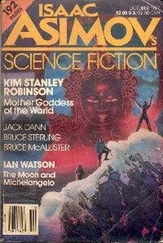The form of government mandated by this constitution can be called polyarchy; power is distributed out through a great number of institutions and individuals, in a web of checks and balances that reduces any possibilities of oppressive hierarchy. The goals of the constitution, listed in the preamble, come down to justice and peaceful dissent. Where those have been created, all else will follow.
Of course the constitution has somewhat receded into the background now, as huge masses of legislation and informal practice have accreted around it, regulating the day-to-day activities of most Martians. But that was its function to begin with and not to be lamented. The constitution was, to my mind, written to give people a sense that their management of their affairs was in no way “natural” or written in stone; laws and governments have always been artificial inventions, practices, and habits. They can change, they have changed, they will change again. That being the case, there is no reason not to try to change them for the better. And that is what we did. What the result will be in the long run no one can say. But I think it has been a good beginning.
It didn’t seem that bad to me but I had an epidural so what do I know. It was like an extremely arduous athletic effort that I couldn’t choose not to do. I’ve seen people’s scornful looks when I mention the epidural, but I say we’re Terran animals and if we’re going to give birth on another planet we deserve a little medical intervention. To insist on a natural childbirth on Mars is a kind of machismo I’m not interested in.
She was hard from the start. She was pulled out of me and put on my chest and I saw this little red face looking me right in the eye and yelling in protest. She was pissed off, you could read that on her face just as clear as on anyone older than her. I doubt not that we’re conscious in the womb, for at least the last part of the confinement, lost in thought without language, like music or meditation. And so we come out with our character already in place, intact and complete. Nothing afterward changes it. And in fact she was pissed off like that for years to come.
She sucked voraciously, cried inconsolably, slept fitfully, shrieked in her sleep as if fully awake—then woke up terrified by her own noise and cried some more. I often wondered what she dreamed about to scare her so. For thousands of years they’ve called it colic and no one knows what it is. Some say it’s the slow adjustment of the digestive system to the barrage of new chemicals. From the writhing of her torso I judge there is some truth to that. But I also think she was still pissed off about being ejected from the womb. Rage at the unfair loss of that narcissistic oceanic bliss. She remembered the womb. Even later when she forgot she remembered, and did everything she could to get back to that place. That’s Zo’s whole story really.
The colic drove me crazy. I couldn’t comfort her and couldn’t get her to stop crying. Nothing worked, and believe me I tried everything I could think of, because it exasperated me no end. Sometimes she cried ten hours straight. That’s a long time when a baby’s crying. The only thing that worked even a little was to hold her in my hands, one under her butt and one behind her head and neck, and raise her up and down rapidly, as if she were in a swing. This boggled her into silence and she even seemed to like it, or at least be interested. In any case she would stop crying. But one time when I was doing it an Arab woman came up to me and put her hand out and said, “Please, you should not do that, you might hurt the baby.”
“I’ve got her head supported,” I told her, and showed her.
“Still, their necks are so weak.” She was nervous, even scared, but persisting.
“She likes it. I know what I’m doing.”
But I never did it again. And I thought later about the kind of courage it takes to remonstrate with a stranger about his or her parenting.
If Michel’s belief in the theory of the four temperaments is correct, which I doubt, then she was choleric. Moody—like Maya, yes, she was. This similarity didn’t bother me as much as people might think. I liked Maya a lot more than she liked me—who wouldn’t, she’s like something out of Sophocles—but she wanted to fight, and I wasn’t going to back down. It was the same with Zo. It’s all a matter of one’s biochemistry—one’s moods I mean. That’s what Michel was saying too really, with all his biological correlations. The four temperaments, sure, except there are forty, or forty thousand. Grouped perhaps loosely in his four, who knows. Anyway Zo was a choleric’s choleric, the pure product.
She was extremely frustrated throughout her first year, when she couldn’t talk or walk. She could see all the rest of us doing those things and she wanted to too. She tipped over a million times, like a top-heavy doll. I kept a supply of butterfly Band-Aids on hand, in fact a complete little medical kit. She babbled authoritatively at everyone, but when they failed to understand her she got furious. She grabbed things out of your hand. She threw her cups and spoons and dishes at you, or on the floor. She would take big swings at you, and was so fast that some of them landed. She would head-butt you with the back of her head—she split my lip twice, but after that my face got faster than her head. Which made her furious. She would throw herself headlong on the floor and beat the ground with fists and feet, and howl. It was hard not to laugh at such histrionics, but I usually avoided letting her see me laugh, as it drove her berserk and her face would go an alarming purple color. So I tried to be noncommittal. It got easy to ignore. “Oh that’s just Zo doing her thing,” I would say. “It’s like an electrical storm going through her nervous system. There’s nothing you can do except let it run its course.”
When she learned to walk she got less cranky. She learned to feed herself too, very quickly. She refused high chairs or boosters or any baby utensils as affronts to her dignity. Once she could get around she was a danger to herself even more than before. She would eat anything. Changing her diapers, I found sand, dirt, pebbles, roots, twigs, small toys, little household objects—it was a real mess. And she would fight like crazy while you tried to change her. Not always, but about half the time. It was like that with all the daily routine—changing clothes, brushing teeth, getting in the bath, getting out of the bath—half the time she would cooperate, half she would object and fight you all the way. And if you let her win it only got worse next time. Give a centimeter and she would go for the kilometer.
I suppose eating dirt might have been how she got sick. She got some variant of the Guillain-Barré virus, but we didn’t know that at the time, we only saw the forty-degree temperature and then she was paralyzed completely, for six days. I couldn’t believe it. I was still in the full shock of it happening when she came out of it and started to move again—first twitches, then everything. It was an amazing relief. But I have to admit that after that she was worse than ever. Her tantrums would last an hour, and if you put her in a room by herself she would do her best to destroy it. She broke bones in both hands. So you had to stay in the room to watch her. I seriously considered making it a padded room.
She was also terrible to other kids. She would walk right up to them and knock them down, almost as if experimentally. It was impersonal, and she didn’t seem malicious—more like deranged. And indeed later we figured out that she had a perceptual problem after her illness, and thought she was farther away from things than she really was. So when she got interested in another person, bam, over they went. She was a cheery little anarchist in her day care, so high-maintenance I was embarrassed to inflict her on the place. But I needed to work and I needed time away from her, so I did it anyway. They didn’t complain, not directly.
Читать дальше
Конец ознакомительного отрывка
Купить книгу












